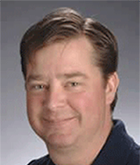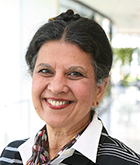2020 Lectures |
Lecture: 12:00 - 1:00 pm
ZOOM meeting:
Meeting ID: 994 0091 4354
Password: 265397
When T cells Get Stressed: Role of the Stress-Activated
Transcription Factor Nrf2 in Food Allergy
Cheryl Rockwell, Ph.D.
Acting Director
Applied Immunology Center for Education and Research
Associate Professor of Pharmacology & Toxicology
Michigan State University
Host: Jennifer Jacob, PhD
Barbara Ann Karmanos Cancer Institute
Wayne State University
-
 Speaker Profile Speaker Profile
Dr. Rockwell received her doctorate from Michigan State University in 2005. As a postdoc, she trained with Dr. Nilo Qureshi at University of Missouri Kansas City and Dr. Curt Klaassen at the University of Kansas Medical Center. She was awarded a K99 grant from NIEHS in 2010 and became an Assistant Professor at Michigan State University in 2011, where she was promoted to associate professor with tenure in 2017. She has published over 30 peer-reviewed papers as well as a book on immunotoxicology protocols. She has served on a number of editorial boards as well as different committees and elected positions in the Society of Toxicology. She received the Outstanding Young Immunotoxicologist of the Year award in 2014. She has been invited to give a number of presentations, including a talk at the joint SOT-FDA* Colloquium on Immunotoxicology in 2015. In 2016, she received the Outstanding New Environmental Scientist award from the NIEHS. In 2019, she received the Early Career award from the Toxicology Division of the American Society of Pharmacology and Experimental Therapeutics.
Nrf2 is a transcription factor activated by oxidative and electrophilic stresses. Numerous studies have shown that Nrf2 has anti-inflammatory effects in a variety of inflammatory animal models. Dr. Rockwell's research demonstrates that Nrf2 modulates T cell activation and polarization. In addition, the widely used food preservative tert-butylhydroquinone (tBHQ) potently activates Nrf2 in murine and human T cells. Currently, her group is studying activation of Nrf2 by tBHQ in CD4 T cells, which promotes Th2 polarization while inhibiting Th1 polarization. In correlation with these data, there is a marked effect of Nrf2 activation on allergy sensitization and anaphylaxis. Overall, her group's data suggest that Nrf2 regulates CD4 T cell polarization with downstream consequences on allergy and immunity.
|

|
Lecture: 12:00 - 1:00 pm
Webex meeting:
Meeting ID: 171 130 2809
Password:mcHZgFpy943
Balancing tissue homeostasis and tumor immune surveillance
through DC:T cell crosstalk
Niroshana Anandasabapathy, M.D., Ph.D.
Associate Professor of Dermatology
Weill Cornell Medicine
Host: Qing-Sheng Mi
Departments of Dermatology and Internal Medicine
Henry Ford Health Systems
-
 Speaker Profile Speaker Profile
Dr. Anandasabapathy is a physician-scientist and board-certified dermatologist. Her Lab focuses on cutaneous immunology, cancer immunotherapy, and DC vaccines, and interrogates how cutaneous immune surveillance and immune homeostasis in the periphery impact the detection, prevention, early formation, and treatment of melanoma and non-melanoma skin cancers. Most recently her group has identified a new immunotherapy target and completed large-scale functional genomics. These efforts relate the development of immune cells in the tumor microenvironment and peripheral tissues such as the skin. Her work has resulted in multiple peer reviewed, high-impact manuscripts (Cell, Nature, Nature Medicine, J Exp Med, etc) since the start of her independent lab in 2013.
|

|
Lecture: 12:00 - 1:00 pm
ZOOM meeting:
Meeting ID: 967 7528 5368
Password: 577353
Immune Dysfunction in Acute Liver Failure
Bryan Copple, Ph.D.
Associate Professor of Pharmacology & Toxicology
Michigan State University
Host: Jennifer Jacob
Barbara Ann Karmanos Cancer Institute
Wayne State University
-
 Speaker Profile Speaker Profile
Dr. Bryan Copple studies the role of innate immune function in liver disease and liver failure, particularly following acetaminophen toxicity. His current work has determined that immune dysregulation is a key feature of acute liver failure resulting from drug-induced liver injury. During progression of acute liver failure, aberrant production of interleukin-10 (IL-10) disrupts trafficking of proinflammatory monocytes into injured regions of liver. This prevents clearance of necrotic cell debris and prevents switching of monocyte-derived macrophages into pro-repair macrophages. Ultimately disruption of these processes contributes to failed liver repair. Interestingly, their studies suggest further that myeloid-derived suppressor cells may be the primary source of IL-10 in acute liver failure.
|

|
Lecture: 12:00 - 1:00 pm
ZOOM meeting:
Meeting ID: 981 5530 1275
Password: 461318
Smoking, Vaping, Inflammation and Immune suppression
Yasmin Thanavala, Ph.D.
Professor of Oncology and Immunology
Roswell Park Cancer Center
Host: Wei-Zen Wei
Barbara Ann Karmanos Cancer Institute
Wayne State University
-
 Speaker Profile Speaker Profile
Dr. Yasmin Thanavala is a renowned expert in infectious disease immunology and vaccine development. Her lab pioneered novel hepatitis vaccines in the form of anti-idiotypic antibody and edible transgenic plants. Her seminal work in defining an immunosuppression network in COPD patients led to the establishment of an important new mouse model of chronic pulmonary inflammation that was published in New England Journal of Medicine in 2020. She is investigating the impact of novel “heat-not-burn” cigarettes on pulmonary inflammation and immunity, with important implication on respiratory virus infection such as SARS-CoV2. Dr. Thanavala has moved her findings into clinical testing and she holds multiple patents from her discoveries. In addition to her research contribution, Dr. Thanavala is deeply committed to training the next generation of scientists and clinician scientists. She also serves on numerous grant review panels, including the most recent service on 2020 NIAID Emergency Awards review panel: Rapid Investigation of Severe Acute Respiratory Syndrome Coronavirus 2 (SARS-CoV-2) and Coronavirus Disease 2019 (COVID-19).
|

|
Lecture: 12:00 - 1:00 pm
ZOOM meeting:
Meeting ID: 818 6883 7607
Password: 880204
Deep Protein Representations to Improve Protein Design
Tristan Bepler, Ph.D.
Postdoctoral Fellow
Research Laboratory of Electronics
Department of Biological Engineering
Massachusetts Institute of Technology
Host: Wei-Zen Wei
Barbara Ann Karmanos Cancer Institute
Wayne State University
-
 Speaker Profile Speaker Profile
Dr. Tristan Bepler received his undergraduate degree in Biology and Computer Science from Duke University and had his doctoral training in computational and systems biology with the renowned scientist Professor Bonnie Berger at the prestigious Computer Science and Artificial Intelligence Laboratory at the Massachusetts Institute of Technology (MIT). He is currently performing his postdoctoral research on developing machine learning methods to better understand and design protein sequence, structure, and function in the synthetic biology group of Professor Timothy Lu at the Department of Biological Engineering at the MIT. The potential application and impact of this new technology in biology and medicine will be immense. Dr. Bepler has published high impact articles in leading scientific journals, including Nature, Nature Methods, Nature Communications, Cell Systems, Advances in Neural Information Processing Systems, and Current Biology.
|

|
Lunch: 12:00 pm
Lecture: 12:15 - 1:15 pm
Hudson Webber Cancer Research Center, Second Floor, Wertz Auditorium
4100 John R. Street, Detroit, MI 48201
The Role of the Stress-activated Transcription Factor Nrf2 in T Cell Function
Cheryl Rockwell, Ph.D.
Acting Director
Applied Immunology Center for Education and Research
Associate Professor of Pharmacology & Toxicology
Michigan State University
Host: Wei-Zen Wei
Barbara Ann Karmanos Cancer Institute
Wayne State University
-
 Speaker Profile Speaker Profile
Dr. Rockwell received her doctorate from Michigan State University in 2005. As a postdoc, she trained with Dr. Nilo Qureshi at University of Missouri Kansas City and Dr. Curt Klaassen at the University of Kansas Medical Center. She was awarded a K99 grant from NIEHS in 2010 and became an Assistant Professor at Michigan State University in 2011, where she was promoted to associate professor with tenure in 2017. She has published over 30 peer-reviewed papers as well as a book on immunotoxicology protocols. She has served on a number of editorial boards as well as different committees and elected positions in the Society of Toxicology. She received the Outstanding Young Immunotoxicologist of the Year award in 2014. She has been invited to give a number of presentations, including a talk at the joint SOT-FDA* Colloquium on Immunotoxicology in 2015. In 2016, she received the Outstanding New Environmental Scientist award from the NIEHS. In 2019, she received the Early Career award from the Toxicology Division of the American Society of Pharmacology and Experimental Therapeutics.
|

|







 Speaker Profile
Speaker Profile